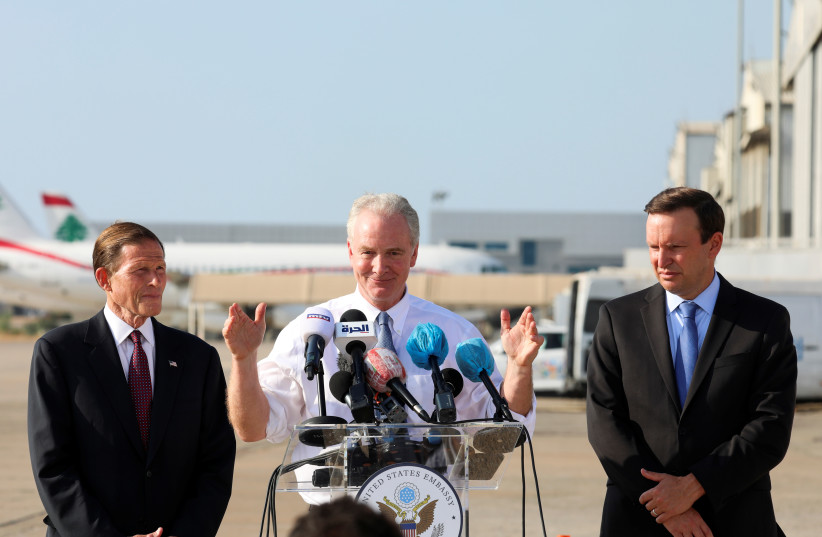A delegation of four US Democratic senators visited Israel on Thursday and Friday, in order to meet the new government and discuss regional issues, including the Israeli-Palestinian conflict.
“We expressed our hopes for the success of the new government and our strong support for a two-state future,” tweeted Senator Chris Murphy (D-Connecticut) after his delegation met with Foreign Minister Yair Lapid on Thursday.
Murphy chairs the Senate Foreign Relations Committee panel dealing with the Middle East, and was the head of the delegation that included Senators Richard Blumenthal (D-Connecticut), Chris Van Hollen (D-Maryland) and Jon Ossoff (D-Georgia).
They also met with Prime Minister Naftali Bennett and President Isaac Herzog.
The delegation also visited the Knesset on Thursday, where they met with Foreign Affairs and Defense Committee Chairman MK Ram Ben-Barak (Yesh Atid) and Ra’am Party leader MK Mansour Abbas.
After meeting with the delegation on Friday, Herzog tweeted, “Bipartisanship is a sacred pillar of the US-Israel alliance. Delighted to welcome a delegation of US Democratic Senators to Jerusalem. Held an open discussion with Senators @ChrisMurphyCT, @SenBlumenthal, @ChrisVanHollen & @Ossoff about our shared interests and values.”
The four men arrived in Israel after a trip to Beirut, where they warned that Lebanon was in a free fall as a result of its destabilizing financial meltdown.
Their comment reflected growing concern about the situation in Lebanon, where a financial collapse that began in 2019 hit a crunch point last month with a crippling fuel shortage that sparked security incidents and warnings of worse to come. They also warned that Iranian fuel being shipped to Lebanon by Hezbollah would come with strings attached, dismissing it as an attempted “photo-op by the Iranians.”
The financial crisis marks the biggest threat to Lebanon’s stability since the 1975-90 civil war.
More than half of Lebanon’s six million people have fallen into poverty. The World Bank says it is one of the sharpest depressions of modern times with its currency plunging more than 90% and the financial system paralyzed.
“Lebanon is in free fall.... We’ve seen this movie before and it’s a horror story... but the good news is it can, should, and hopefully will be avoided,” Blumenthal told reporters on Wednesday at the end of a two-day visit.

LEBANESE POLITICIANS, who have failed to do anything to arrest the collapse, have been squabbling for more than a year over the make-up of a new cabinet to replace the one that quit in the aftermath of the Beirut Port explosion on August 4 of last year.
A new cabinet capable of implementing reforms is a necessary precursor to foreign aid. The United States is the biggest foreign aid donor to Lebanon.
The congressional delegation met Lebanese leaders including President Michel Aoun, the Maronite Christian head of state, who expressed hope that the government would be formed this week, the presidency said in a statement.
Aoun, a Hezbollah ally, has on several occasions expressed optimism about the government being agreed upon soon.
"We did hear good news today," Murphy told reporters, adding he expected a government to be formed by the time he returned home.
Aoun's adversaries accuse him and his faction, the Free Patriotic Movement, of obstructing the formation of a government by demanding a third of the seats, meaning effective veto power.
The president denies this, telling the senators that "many obstacles had been overcome."
With the state floundering, Hezbollah, long part of the ruling system, announced last month that it was importing fuel oil from Iran, saying it aims to ease the crisis. Its adversaries have said this further undermined the authority of the state and exposed Lebanon to the risk of US sanctions.
Washington has designated Hezbollah as a terrorist group.
Lebanon's caretaker energy minister said on Wednesday that an import permit had not been requested for the fuel shipment.
Washington has been in talks with Egypt and Jordan over a plan to ease Lebanon's power crisis. The Lebanese presidency has said it involves using Egyptian gas to generate power in Jordan that would be transmitted via Syria, which is under US sanctions, including the so-called Caesar Act, which sanctions the Syrian government, including its president Bashar Assad, for war crimes against the Syrian population.
"The complication as you know is the transport via Syria," said Van Hollen. "We are (urgently) looking for ways to address that despite the Caesar Act."
